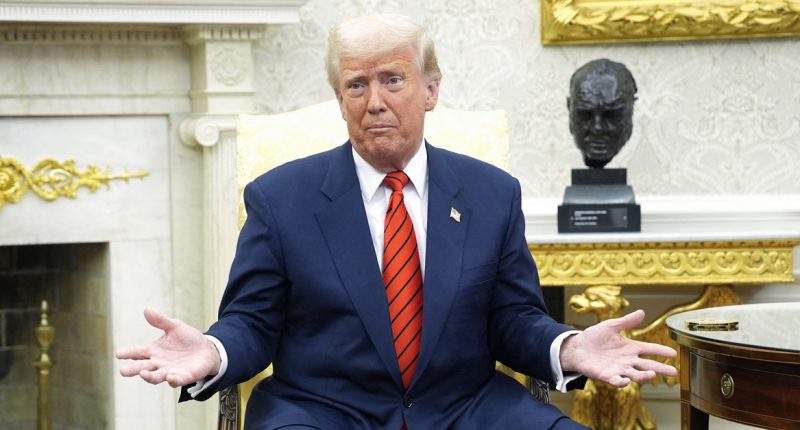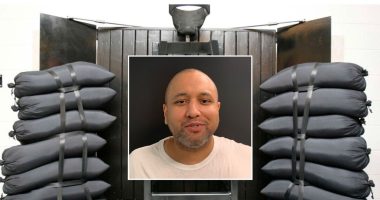Share this @internewscast.com
US President Donald Trump sits during his meeting with NATO Secretary General Mark Rutte in the Oval Office at the White House in Washington on March 13, 2025. Photo by Yuri Gripas/Abaca/Sipa USA (Sipa via AP Images).
President Donald Trump’s tariffs have resulted in “chaos” for states and the American economy, giving them “no practical ability to recover the enormous expenses they will incur when buying vital goods and equipment” from importers, Oregon Attorney General Dan Rayfield alleges in a new court filing.
The Democratic AG is leading a coalition of 12 states suing Trump over the controversial tariffs, arguing that he has “no authority to arbitrarily impose” such levies on Americans “as he has done here,” according to the group’s complaint. Rayfield filed a motion for a preliminary injunction on Wednesday to block Trump from implementing his “illegal tariffs” under four executive orders that he’s signed since retaking office.
“President Trump has claimed the unilateral power to impose, modify, and escalate new tariffs on any country at any rate for however long he likes,” the motion says. “He professes to have discovered that power in a decades-old law, the International Emergency Economic Powers Act (IEEPA), that no other President has used in that manner. The result for states, and the American economy more generally, has been chaos.”
Love true crime? Sign up for our newsletter, The Law&Crime Docket, to get the latest real-life crime stories delivered right to your inbox.
According to the plaintiff states, which include New York, Oregon, Arizona, Connecticut, and Illinois, Trump unlawfully imposed the tariffs under an emergency statute in the absence of any actual emergency — an argument reminiscent of challenges to Trump’s invocation of an 18th-century wartime power to conduct mass deportations with little or no due process, despite the fact that the U.S. is not at war.
“The text and history of the [IEEPA] — the statute the President has invoked for the most damaging of his tariffs — confirm that the President cannot impose such tariffs under that law,” the complaint states. “By claiming the authority to impose immense and ever-changing tariffs on whatever goods entering the United States he chooses, for whatever reason he finds convenient to declare an emergency, the President has upended the constitutional order and brought chaos to the American economy.”
As previously reported by Law&Crime, the IEEPA grants the executive sweeping authority to quickly combat international economic crises and permits the executive to order sanctions as a rapid response to international emergencies.
The states are seeking a court order declaring Trump’s tariffs “unlawful” and therefore not in effect, as well as an injunction preventing government agencies from enforcing the tariffs. Trump is currently planing for another round to take effect on July 9.
According to Rayfield, Trump’s tariffs have been disrupting procurement by state agencies and universities and impairing state budgeting processes. “Here, economic logic demonstrates that even using conservative estimates the States will face $1.6 billion in costs due to the announced tariffs,” Rayfield said in the Wednesday motion, alleging that the economic harm to the states is concrete and particularized.
“Even where the States are not paying the tariffs directly, the impact of those tariffs on the cost of goods, equipment, and services on which the States rely, and the impact on the States’ ability to accurately plan and budget, are traceable to the tariffs themselves,” Rayfield explained.
The states’ suit and motion comes after California filed its own lawsuit last month, seeking to halt Trump’s levies and claiming they have done irreparable damage the state’s finances.
“No legal authority gives the President the sweeping power he has arrogated to himself, and Congress did not intend IEEPA to be the basis for such action,” Rayfield concluded Wednesday. “This Court should enter a preliminary injunction to stop it.”














